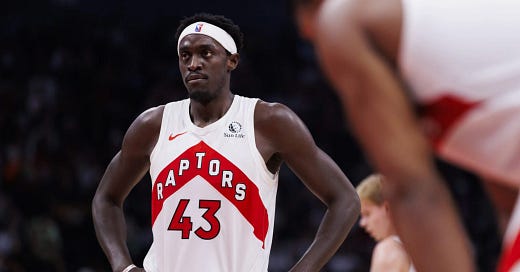Pascal Siakam’s Pacers Trade Is a Farewell to the 2019 Champion Raptors
Trading Siakam to Indiana means the Raptors have fully moved on from their title-winning core — and into a rebuild.
The 2018-19 Toronto Raptors were always going to be one of the most fascinating champions in NBA history.
After years of postseason disappointment (usually at the hands of LeBron James), Toronto landed Kawhi Leonard in a blockbuster trade for franchise icon DeMar DeRozan, and navigated a treacherous path through the suddenly LeBron-less Eastern Conference to the NBA Finals. Waiting for them were the back-to-back defending NBA champ Golden State Warriors, who were installed as heavy favorites before the series. But through a combination of Leonard’s excellence, Toronto’s deep supporting cast and, yes, a few key Warrior injuries — shh, don’t you dare put an asterisk on that title! — the Raptors shocked the basketball world by winning the franchise’s first-ever NBA crown.
And within weeks, the dismantling process had already begun, with Leonard and Danny Green (Nos. 1 and 3 on the team, respectively, in regular season Wins Above Replacement) signing elsewhere. Others soon followed: A year later, in 2019-20, only roughly 60% of the WAR from the Raptors’ championship squad came from players who were still members of the team. That figure dropped to about 50% by 2020-21, 30% by 2021-22 and just a shade over 20% at the start of this season.
Then came the recent trades of OG Anunoby (who’d logged 20.2 MPG for the championship Raptors) to the New York Knicks and, on Wednesday, Pascal Siakam (whose 9.5 WAR ranked second only to Leonard’s 10.7 that season) to the Indiana Pacers. Siakam should be a good fit alongside Tyrese Haliburton and the high-octane Pacers, but his departure just about fully closes the book on those champion Raptors as well.
After the Siakam trade, the only member of Toronto’s title-winning roster who remains with the franchise is forward Chris Boucher who averaged just 5.8 MPG in ‘18-19. His 0.4 WAR that season represented just 0.8% of the team’s total — meaning 99.2% of the value from the Raptors’ championship roster was liquidated within five years.
It’s rare to see that much value leave a champion in such a relatively short period of time. Even if we just look at the share of remaining value from players who were on the team at all this year — which would include Anunoby and Siakam — Toronto’s 22.2% mark is the lowest by any champion since 1979-80 with an average age as young as the Raptors (27.3 years). Generally speaking, there’s an inverse relationship between a champion’s average age and its share of WAR remaining five seasons later, simply because older teams are less likely to retain their stars for that many years in the future:
(For an extreme example of that phenomenon, check out Michael Jordan’s second Chicago Bulls three-peat team, of which zero percent of the value came from players still on the roster five seasons later.)
The 2018-19 Raptors also stand out in the chart as a particularly unique one-off champ, which I’m defining as any title that wasn’t won as part of a stretch with at least two championships in three years. The 2015-16 Cleveland Cavaliers — who also beat the Warriors for their title — and the 2013-14 San Antonio Spurs lost a similar share of WAR within five years, but both of those teams were older than Toronto was. And while the 1982-83 Philadelphia 76ers were younger, they still had more of their core intact five years later than the Raptors, with key players Maurice Cheeks and Andrew Toney remaining in Philly through the end of the 1987-88 season. (This would be like if Siakam and Anunoby stuck around all year in 2023-24.)
I’ve written before about how 2019 was the Year of Ending Long Title Droughts — and, mostly, the Year of the One-Off Champ as well. (Only Patrick Mahomes and the Kansas City Chiefs were immune to that effect.) It seems to be quite hard for teams that haven’t won before to do so again with consistency in the future: The forces that make it hard to win in Toronto, to begin with, for instance, may also make it that much harder to win a second time, and so forth.
That might have meant the Raptors were destined from the start to quickly see their championship value depart and end up as an outlier on charts like the one above. But most NBA championships are won the conventional way — as part of a dynasty that stays together for years. By contrast, winning one with a different formula may, in fact, make it more special, even if the success is more fleeting.
Filed under: NBA





